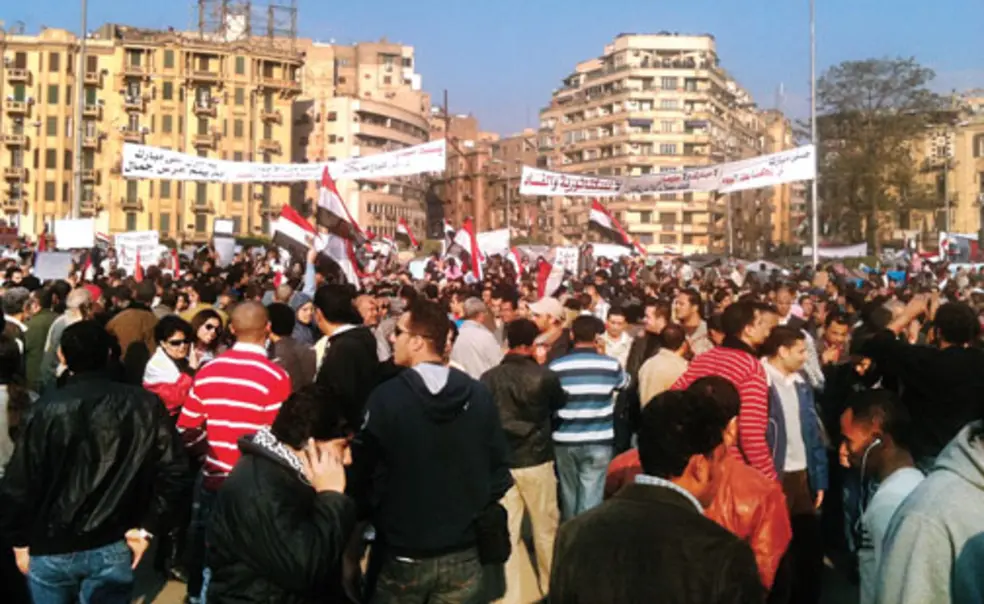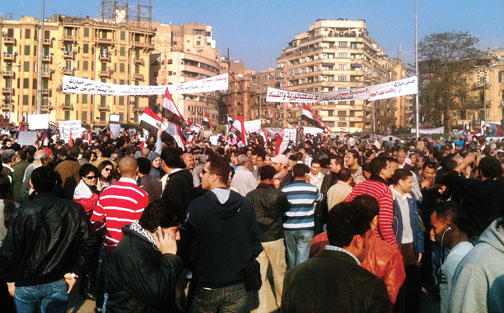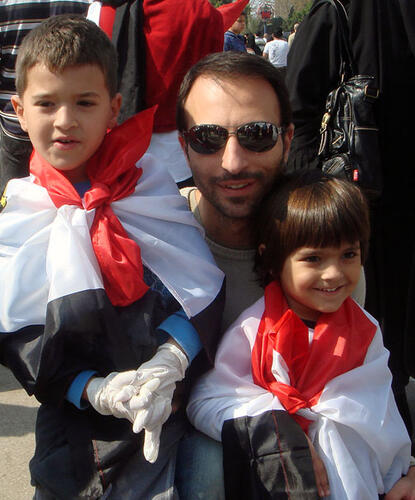My family and I live on an island on the Nile called Zamalek, located in the center of Cairo. My parents, as well as my brother and his family, live five minutes away; my in-laws, 15. Many of our friends, some of whom we’ve known since before I can remember, live within close proximity. With some notable years excepted — such as my time at Princeton — I have lived in Zamalek for most of my life. That is why, for me and many of her inhabitants, boisterous, polluted Cairo, with more than 20 million people, still sometimes feels like a village.
It also is for this reason that for 18 days my family, friends, and I had front-row seats and even participated in the making of history. That privilege cost more than 300 Egyptians their lives and injured thousands more, while the rest of us paid the price in fear, anxiety, and depression. At the same time, we also experienced courage, dignity, exhilaration, and jubilation. It was a dramatic and emotional roller coaster of an experience that I hope to endure only once in my lifetime, but it did provide me with four lessons:
Lesson 1: Don’t trust conventional wisdom. Exactly one month before the uprising, conventional wisdom had it that Egypt was not ready for revolution. Our North African and Arab brethren in Tunisia just had booted out their own dictator after a 23-year reign. While the two countries shared many of the same social failures and had similar demographics, it was understood that Egypt’s strongman, Hosni Mubarak, was too powerful and too entrenched, while her people were too uneducated and too passive.
So on Jan. 25, our revolution began with a surprise. Young Internet activists had organized a demonstration to coincide with Police Forces Day, originally intended to celebrate the police. Mubarak famously dismissed the demonstration: “Let them have some fun.” Many more people than expected turned up. Something had changed, and people had lost their fear. Meanwhile, in cyberspace, Facebook and Twitter were burning up with revolutionary zeal. The next two days saw the momentum build to an insurmountable level.
Lesson 2: People with focus are unstoppable. It took me a few days to get off the Facebook-activist couch, but the Day of Rage — Friday, Jan. 28 — seemed like a good time to do it. We began the day by finding out that we had lost all mobile communication: The night before, the government had shut down the Internet. The plan was for people to gather after Friday prayers. I’m not religious, but in this case prayer seemed liked an apt ritual, so I joined my friends at the mosque. The imam leading the prayer chose to recite passages from the Quran referencing Pharaoh and Moses.
We decided that we would join demonstrations that were starting out in the more open streets of Mohandisseen on the west bank of the Nile. The marchers were young and old, overwhelmingly middle-class but some rich and poor, Muslims, Christians, fundamentalists, liberals, office workers, students, friends, neighbors, and strangers. As we marched, we chanted: for others to join us, for the regime to fall, and for our freedom. Eventually our march headed toward a security blockade, and a call went out to don face masks. Some people had medical masks, others bandanas, others just tissue. Still others had swimming goggles and scuba masks.
We poured vinegar on our medical masks, as we heard rumors that this made the tear gas more bearable. As we got closer to the blockade, we started to see and hear the tear-gas canisters as they flew toward us. Then we started to smell them. From a distance, tear gas produces stinging in the nose and eyes as well as irritation of the skin. Direct exposure results in nausea, loss of motor control, and a burning sensation, as if acid had been thrown on your face. Now we began to move back and forth, with the crowd surging forward only to be met by massive amounts of tear gas, forcing people back. Some people collapsed under the effects of the tear gas, but others were there to take their places. The people came together as one with steadfast focus. Individuals protected each other, sharing everything they had: water, vinegar, soda (another tear-gas remedy), tissues, masks, food, and most of all, support. Eventually, our front lines overran the security troops and the demonstration surged forward.
Lesson 3: The right to bear arms is not a bad idea. On Jan. 29, we were in Tahrir Square when I received a panicked phone call from my father. He informed me that all the police and security forces had been withdrawn from the streets, that the army was only partially deployed, that prisoners had been released from jails, and that thugs were on the prowl. We were urgently needed back home to protect our streets.
We were fortunate that a colonel, who had been at the local officers club, took it upon himself to organize the neighborhood militias. We were divided into groups, each of which would protect one of the entrances of the island of Zamalek. We were told to arm ourselves with weapons that could kill or disable in one blow, because our adversaries would seek to do the same. My weapon was a baseball bat; others had golf clubs or had fashioned spears by attaching kitchen knives to sticks, and still others had antique swords, handguns, and even automatic weapons. Knowing that we had assault rifles on our side was comforting on a cold street at 4:30 a.m., as gunshots rang out from all directions. I always have been amused by America’s fascination with the right to bear arms, dismissing it as national zealotry. After living through the necessity of forming a neighborhood militia, I now recognize the protection it affords.
We would spend the next four nights patrolling the streets. The only upside was that I was able to meet many of my neighbors, who turned out to be pretty good people.
Lesson 4: Give people dignity, and the results are amazing.
Tahrir Square was an amazing space. Except for the 48 hours when Mubarak’s cavalry of thugs charged and firebombed the protesters, it was a festive, happy place. Tahrir was the one location where Egyptians were truly free. That freedom brought out the humanity in people; they became kind, generous, creative, witty, tolerant, compassionate, and dignified. While Egyptians are famous for never standing in line, they would do so for hours to get into Tahrir Square. As you walked past the army tanks, volunteers checked your IDs and patted you down to prevent the entry of weapons; once inside, you were cheered by the community proclaiming the entry of a free Egyptian.
Inside, everyone had an opinion and was willing to share it. If you were caught up in a discussion with one person, others would listen and interject. People from all walks of life and religious backgrounds debated freely, even protecting each other when they prayed. It also turned out that Egyptians have a sense of humor, with political jokes aplenty and the majority of placards delivering their message playfully and with wit. One young man’s sign proclaimed: “Leave already, my arm is hurting.”
Eventually Tahrir became practically a nation apart. Regular people put on latex gloves to pick up trash. Tahrir developed into an egalitarian, orderly, functioning community within a stratified, dysfunctional metropolis. A myriad of civil services developed spontaneously, including security, trash collection, medical care, and food distribution. Some people would show up for just a few hours, while others arrived and vowed that they would not leave before Mubarak left.
Postscript On Friday, Feb. 10, my parents, brother, and our families huddled in front of the television waiting for the important announcement that was due. We were slightly skeptical; the positive spirits of the previous day had been dashed by Mubarak’s disastrous and frustrating speech. Then the vice president of two weeks came on. His speech was short, but he told us the only thing we needed to know — that Mubarak had resigned, and Egypt never would be the same again. That night, the people spilled into the streets of Cairo in a whirl of red, white, and black, as if in an instant we had won the World Cup several times over.
After being on top of the world for the weekend, the hangover has started to set in. The next phase will require hard work and difficult decisions: What political system do we want? Should we keep and amend our butchered constitution, or start from scratch? When and how can we elect our leaders? And not least: How can we stabilize our economy? But our people are optimistic. We have demonstrated our strength as a nation, and believe that with pride and courage, we can achieve incredible things. If you want to support our effort, come visit us; I know we always have had our history and monuments, but perhaps our revolution has demonstrated the peacefulness and decency of our people as well.














No responses yet